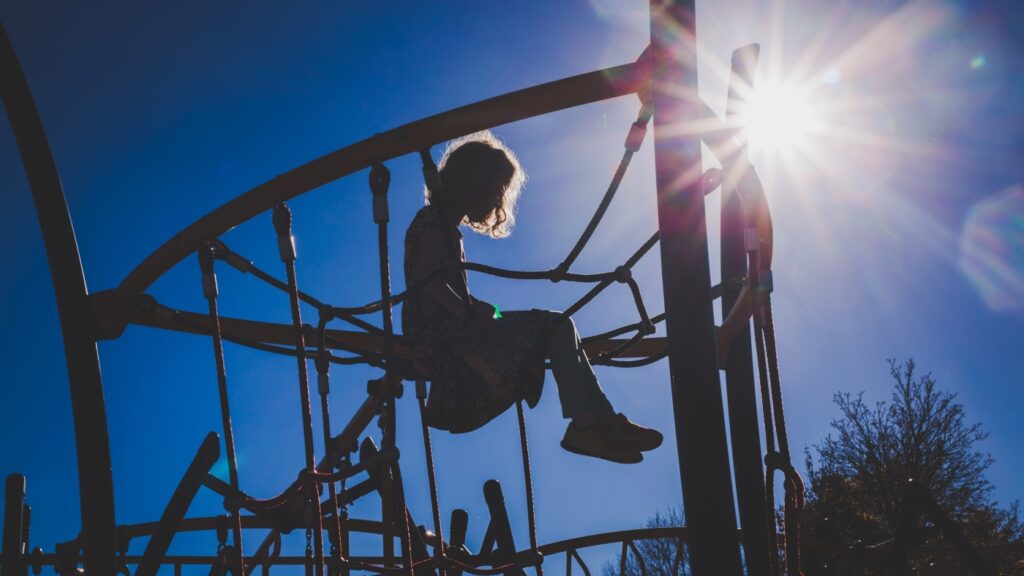Republicans are proposing changes that could result in some children and families losing access to health care, food benefits and financial assistance.
Annie Otzen/Moment RF via Getty Images
hide caption
toggle caption
Annie Otzen/Moment RF via Getty Images
Low-income children and families would be among the groups hit hardest by Republicans’ One Big Beautiful Bill Act.
While the bill would be a boon to wealthy Americans, it would scale back resources for the nation’s poorest households, the nonpartisan Congressional Budget Office (CBO) warned in a recent letter to lawmakers.
In an effort to pay for an extension of the 2017 Trump tax cuts, Republicans in both the House and Senate want to change or reduce key social safety net programs that provide health care, food benefits and financial assistance for millions of children.
Here’s what to know.
Health care for children
More than 37 million children are enrolled in either Medicaid or the Children’s Health Insurance Program (CHIP), a federal program that provides affordable health insurance to pregnant mothers and children who live just above Medicaid’s poverty threshold.
Combined, Medicaid and CHIP protect nearly half of all children in the United States, beginning with important prenatal care, covering over 40% of U.S. births as well as nearly half of all rural births, and continuing to insure millions of vulnerable children into young adulthood.

Congressional Republicans want to continue to allow states to impose waiting periods before families can enroll in CHIP and to lock them out of the program if they fail to keep up with premiums.
They also propose changing Medicaid to include a first-ever national work requirement. As the House bill is written, it would exempt parents, “but what we’ve seen from past experience with work requirements is that exemptions are not always effective,” says Allison Orris, director of Medicaid policy at the liberal-leaning Center on Budget and Policy Priorities.
Senate Republicans propose going even further, with a part-time work requirement including parents of children over 14.
“If [parents’] earnings go up because they’re complying, that actually could be good for the kids,” says Kevin Corinth, who studies poverty and safety net programs at the conservative-leaning American Enterprise Institute (AEI). “Because there is good research showing that, when parents work and we get more earnings coming into the household, that can improve current and future outcomes [for children].”
In addition to work requirements, Republicans are proposing other changes that would create new administrative hurdles for families, according to Georgetown University’s Center for Children and Families.
“When there’s more red tape, we know that it’s harder for families,” says Joan Alker, head of the center and a Georgetown research professor.
“To see these kinds of cuts is very, very scary.”
House Speaker Mike Johnson’s office defended the changes in a press release, writing that “Republicans are protecting and strengthening Medicaid for American citizens who need and deserve it by rooting out waste, fraud, and abuse.”
He also claimed on NBC’s Meet the Press, “there are no Medicaid cuts in the Big, Beautiful Bill. We’re not cutting Medicaid.”

Yet CBO estimates the House bill would cut federal spending on Medicaid by roughly $800 billion over the next decade, and the Commonwealth Fund, a private foundation focused on improving health care access, estimates 1 in 5 children could be at risk of losing their Medicaid coverage if the House proposal goes into place.
Alker says the House changes would force states to make difficult decisions about whether to cut services or raise taxes.
“Governors are gonna have to do the dirty work,” she says. And the Senate’s proposal, she warns, would be even harder on states.
According to research by CBO, consistent Medicaid coverage in childhood increases earnings in adulthood, which increases tax revenue and can gradually repay the federal government for its early investment.
In fact, CBO found, “increasing children’s enrollment in Medicaid would reduce the future federal deficit by between roughly $800 and $3,400 per child per year of enrollment.”
Food assistance at home and at school
House Republicans have also proposed big changes to the federal Supplemental Nutrition Assistance Program (SNAP), commonly known as food stamps, which, according to the U.S. Department of Agriculture, helps pay for groceries for more than 15 million children in the U.S.
This bill would bring “the deepest cut to food assistance in history,” says Katie Bergh, a senior policy analyst for food assistance at the Center on Budget and Policy Priorities.

The House bill would expand SNAP’s existing work requirements, though Bergh says “research has repeatedly shown that this doesn’t increase people’s employment. It doesn’t increase their earnings. It just cuts people off of SNAP and leaves them hungry.“
The House bill would also cut more than $290 billion from SNAP over 10 years – a cut Bergh estimates would “eliminate or substantially reduce” food assistance for more than 2 million children.
And the House proposal could, for the first time in the history of SNAP, put states on the hook for between 5% and 25% of the cost of food benefits.
Whether this shift in funding, from the federal government onto states, is a good idea is “debatable,” says AEI’s Corinth, though he points to one potential upside: It could force states to have “more skin in the game.“
One potential downside, according to CBO, is that some states “would modify benefits or eligibility or possibly leave [SNAP] altogether because of the increased costs.”
And for children, losing access to SNAP benefits could hurt them in more ways than one, as they would also lose their automatic enrollment in free meals at school.
In its analysis of the overall impact of the One Big Beautiful Bill, CBO estimates resources for the poorest households “would decrease by about $1,600 per year,” a loss “mainly attributable” to cuts in the social safety net, including Medicaid and SNAP.
By contrast, CBO predicts the wealthiest households would see an average annual gain of $12,000.
House Republicans hotly dispute CBO’s math, with Speaker Mike Johnson claiming “the biggest beneficiaries of this [bill] will be low- and middle-income Americans.”
Senate Republicans’ proposal mirrors the House proposal in many ways, including a work requirement and significant cost-shifting onto states.
Tax benefits for families
Senate Republicans are proposing updates that could improve and expand access to a handful of tax benefits that help families pay for child care, including the Child and Dependent Care tax credit.
“Expanding child care tax credits in the Senate bill is a step in the right direction toward making care more affordable and accessible for families nationwide,” Sarah Rittling, executive director of First Five Years Fund, said in a statement. Her organization advocates for affordable access to quality child care and early learning.

Researchers and child policy experts are less supportive of proposed changes to the Earned Income Tax Credit (EITC) and the Child Tax Credit (CTC).
The EITC is essentially an anti-poverty program in the form of a refundable tax credit that AEI’s Kevin Corinth points out provides low-income, working families with extra help. Congressional Republicans are proposing additional administrative hurdles that families would have to overcome to qualify. Namely, requiring that they go through an onerous precertification process for their children before being able to claim the credit.
This additional step would be a burden not only on families but on the IRS, which has been the subject of severe staff cuts by the Trump administration.
Then there’s the current Child Tax Credit, which can lower a family’s tax bill by up to $2,000 per child. House Republicans want to increase that to $2,500. But households have to earn a certain amount of income to be eligible for the full credit.
Republicans are also “making what is, in theory, a new higher credit much harder for families with children to actually receive,” says Megan Curran, policy director with the Center on Poverty and Social Policy at Columbia University.

Current law requires children to be either U.S. citizens or legal permanent residents to be eligible for the CTC. The House bill could disqualify more than 4.5 million children, Curran estimates, because it would require both parents to have a Social Security number.
The Senate bill would require that only one parent have a Social Security number for their child to be eligible. It’s unclear how many children that change would still disqualify.
The bill would also continue current policy, blocking the lowest-income families from qualifying for the full tax credit.
“Under current policy, a two-adult, two-child family needs at least $36,000 [in income] in order to get the full [credit],” Curran says. “That’s 1 in 4 kids nationwide who are left out of the full credit.”
On the other hand, wealthy households earning up to $200,000 for individuals, or $400,000 for couples, can claim the full credit.
This disparity would get even more pronounced if the credit grows, Curran says, with that two-adult, two-child family now needing to earn $48,000 to claim the full credit.
“As a result, under the House Reconciliation Bill, 1 out of every 3 children would be left out of the full credit nationwide,” Curran says.
Senate Republicans are pitching a smaller increase to the CTC, to $2,200, but the underlying machinery would similarly limit the benefit for the lowest-income households.
Many countries employ some kind of child benefit for families, but Curran says the U.S. is unusual in that “we exclude the families with lower and moderate incomes. And those are children who arguably could really benefit from this type of investment the most.”
In 2021, Congress briefly increased and expanded the child tax credit to include the nation’s lowest-income families. The expansion was short-lived — just six months — but research shows it helped cut the share of children living in poverty by nearly half.
Research shows investing in vulnerable children isn’t just a benefit to them and their families, it also provides lifetime returns to the nation.
“Every dollar that you spend on the child tax credit in an expanded form that reaches all kids would return at least $10 a year,” Curran says.
That’s because children would be healthier, she says, and do better in school. Later, they would get better jobs and pay more back into the system, in the form of taxes.


